The Warriors and Cavaliers will meet for the second straight NBA Finals. LeBron James and Stephen Curry, arguably the two best players in the game, will pick up where they left off, with Golden State winning in six games last year. Although they play on different sides of the country and only meet twice a year during the regular season, the Warriors and Cavaliers have become an NBA Finals rivalry in the tradition of Lakers-Celtics (three chapters), Bulls-Jazz and Heat-Spurs.
Minneapolis Lakers vs. New York Knicks (1952-1953)
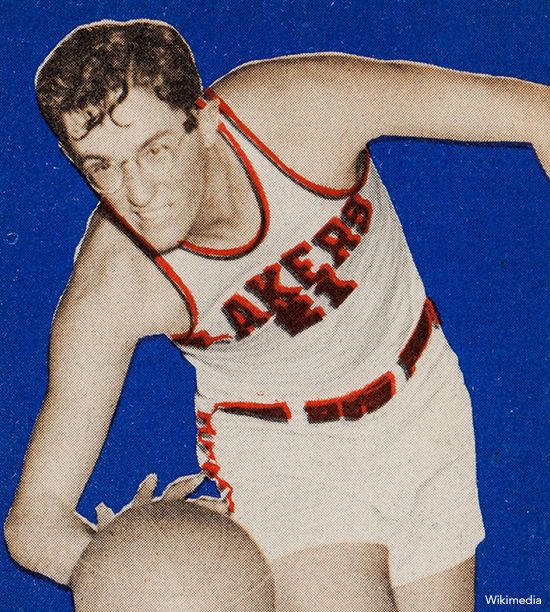
In a seven-game thriller in 1952, George Mikan's Lakers held off Connie Simmons' Knicks. Mikan averaged 21.6 points and 17.4 rebounds in the series, and he dropped 22 points in an 82-65 Game 7 win in Minneapolis. The following seasons, both teams returned to the Finals, but the Lakers did not mess around. After dropping Game 1 in Minneapolis, the Lakers won four straight, the last three at Madison Square Garden. Mikan became the first player to the win the NBA All-Star Game MVP and NBA Finals in the same season. The Lakers won a third straight title in 1954, against the Syracuse Nationals, capping off a stretch of five titles in six seasons.
Boston Celtics vs. St. Louis Hawks (1957-1958, 1960-1961)
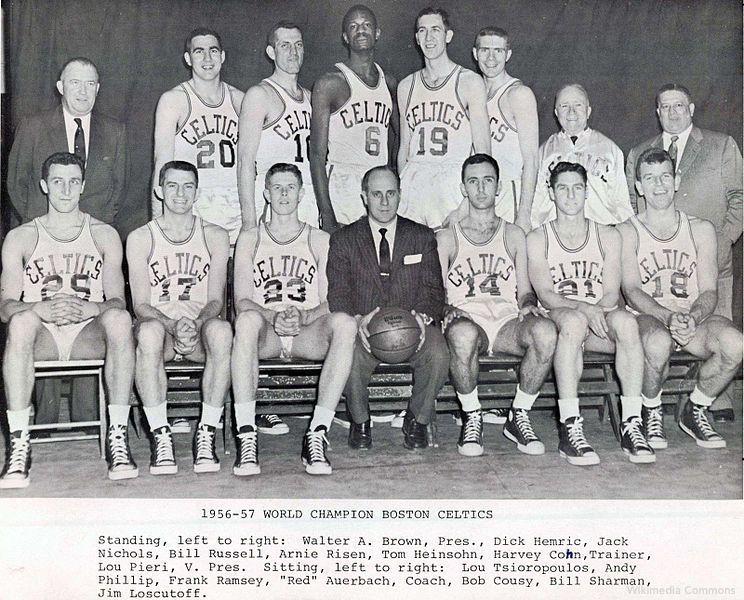
When the Celtics used a territorial pick on Tom Heinsohn in 1956, the team forfeited its first-round draft pick. However, the Celtics traded with the Hawks for St. Louis' second overall pick, Bill Russell. Boston sent All-Star Ed Macauley and former 21st overall pick Cliff Hagan to St. Louis in the deal. In the 1957 Finals, Heinsohn led the Celtics in scoring with 24.0 points per game, while Russell recorded 22.9 rebounds. The Celtics won the series in seven games. For St. Louis, Bob Pettit averaged 30.1 points, while Hagan averaged 16.1 and Macauley 14.9. In 1958, the Hawks won their first title in six games, thanks in part to 25.2 points per game in the Finals by Hagan. The Celtics swept the Lakers in 1959, and by the time the Hawks returned to the Finals in 1960 and 1961, Bill Russell had become Bill Russell. He averaged 16.7 points and 24.9 rebounds in the 1960 Finals and 17.6 points and 28.8 rebounds in the 1961 Finals. Macauley retired in 1959.
Boston Celtics vs. Minneapolis/Los Angeles Lakers (1959, 1962-1963, 1965-1966, 1968-1969)
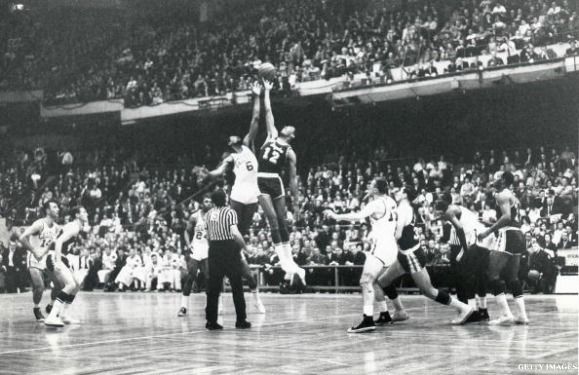
The first edition of the Celtics-Lakers NBA Finals rivalry will be remembered for Boston's dominance and LA's futility. In seven meetings over 11 years, the Celtics went 7-0. Elgin Baylor and Jerry West averaged 40.6 and 31.1 points, respectively, in the 1962 Finals, but the Celtics won in seven games. The Lakers again pushed the Finals to seven games in 1966, but Bill Russell lifted the Celtics with 25 points in Game 7. In 1969, the final chapter of this Celtics-Lakers Era, the Lakers used the addition of Wilt Chamberlain to take a 3-2 series lead. Russell held Chamberlain to eight points in Game 6. In Game 7 Chamberlain, who finished with 18 points, injured his knee with about five minutes left and the Lakers trailing by seven. With Wilt on the bench, Los Angeles actually cut the lead to one point with two minutes left. Chamberlain pleaded to return to action, but Lakers coach Butch van Breda Kolff infamously said, "We're doing fine without you." The Celtics, won, 108-106, the only win by a road team in the series, sending Russell off with his 11th ring. Jerry West won the inaugural NBA Finals MVP Award, and he is still the only member of a losing team to ever claim the honor.
New York Knicks vs. Los Angeles Lakers (1970, 1972-1973)
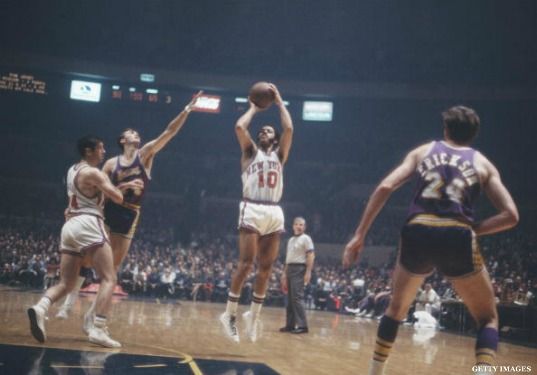
When the Knicks finally dethroned the Celtics in the East, the Lakers thought they finally had their chance. Although the Knicks took a 3-2 series lead, Willis Reed tore a thigh muscle and missed Game 6, which the Lakers won 135-113. In Game 7, Reed famously hobbled out of the tunnel during warm-ups and sent the Madison Square Garden crowd into a frenzy. Reed scored the first two baskets of the game, and although he did not score again, Walt Frazier went for 36 points, 19 assists and seven rebounds. The Knicks won 113-99, claiming New York's first NBA title. After both teams missed the 1971 Finals, the Lakers finally had their moment in 1972. L.A, had added Gail Goodrich, while the Knicks brought in Earl Monroe. Without Reed, who missed most of the season with a knee injury, the Knicks could muster only one win, giving the Lakers their first title in LA. In 1973, in the third Finals meeting in four seasons, the Knicks had the last laugh, winning in five games. Reed, back healthy, averaged 16.4 points and 9.2 rebounds, en route to his second NBA Finals MVP Award.
Seattle SuperSonics vs. Washington Bullets (1978-1979)
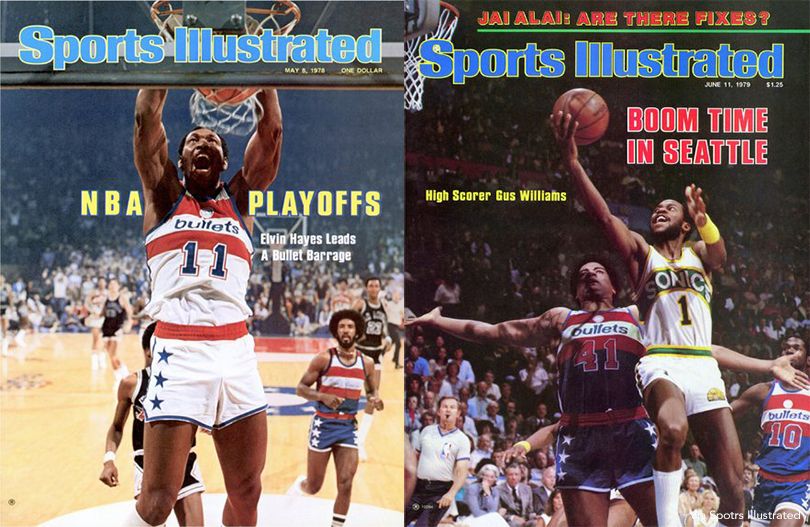
In the playoffs, the Bullets upset the 76ers and the Spurs, the two teams that finished ahead of them during the regular season in the Eastern Conference. Then in the Finals against the SuperSonics, the Bullets trailed 3-2 in the series. They won Game 6 at home 117-82 to set the Finals record for largest margin of victory. In Game 7 at Seattle, Sonics guard Dennis Johnson shot 0-for-14, which helped the Bullets win 105-99. In a case of a player being rewarded for contributions that go beyond the stat sheet, Bullets center Wes Unseld is voted Finals MVP while averaging 9.0 points, 11.7 rebounds and 3.9 assists. Neither team was really expected to make it to the Finals in 1978. But in 1979, each team had the best record in its conference and advanced to the Finals again. This time Johnson came through for Seattle as the Finals MVP, and the SuperSonics won it in five games.
Los Angeles Lakers vs. Philadelphia 76ers (1980, 1982-1983)
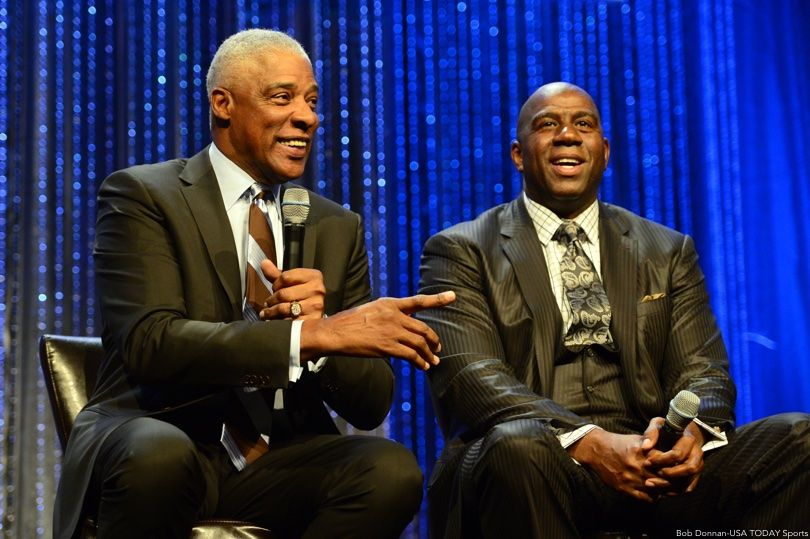
In the 1979 NBA Draft, the Lakers had the first overall pick as compensation for Gail Goodrich signing with the Jazz in 1976. In Game 6 of the 1980 Finals as Kareem Abdul-Jabbar sat home in Los Angeles with an ankle injury, Johnson started at center for the Lakers and played all five positions. He finished with 42 points, 15 rebounds and seven assists in a 123-107 win that clinched the series at the Spectrum. Julius Erving and Darryl Dawkins both averaged over 20 points in the series for the Sixers. In 1982, the 76ers had a new weapon. Andrew Toney came into his own in the Finals, averaging 26.0 points. The Lakers countered with a monster core that saw six players average at least 13 points in the series. A now-established Johnson won the series MVP, averaging 16.2 points, 10.8 rebounds and 8.0 assists. The 1983 Sixers finally beat LA, thanks to the addition of Moses Malone. Philly dominated the regular season, going 65-17, and Malone promised the Sixers would win their three playoff series, "Fo, fo, fo." The campaign ended in Fo, fi, fo, as the Sixers dropped a game in the conference finals to the Bucks. Malone averaged 25.8 points and 18.0 rebounds in a Finals sweep of the Lakers.
Los Angeles Lakers vs. Boston Celtics (1984-1985, 1987)
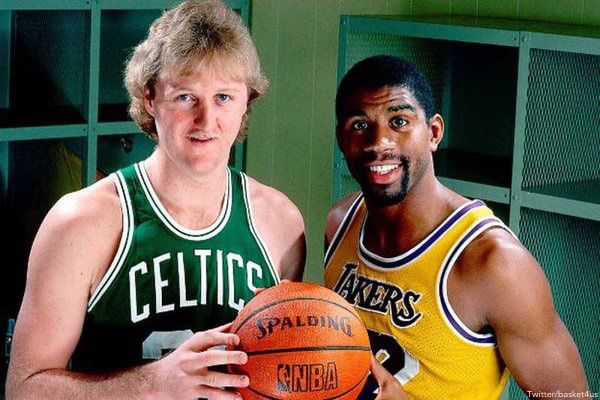
In perhaps the most famous NBA Finals rivalry of all time, Magic's Lakers only met Larry Bird's Celtics three times. But those three meetings were legendary. In 1984, tensions popped during Game 4 in L.A., which Boston won in overtime. Kevin McHale clotheslined Kurt Rambis. Bird and Abdul-Jabbar jostled later in the game and Cedric Maxwell mocked James Worthy for "choking" at the free throw line. After the teams split Games 5 and 6, the Celtics hosted the Lakers in roughly 91-degree temperatures in Game 7 at the Boston Garden. Maxwell sealed the game with a late steal, and Larry Bird won his first NBA Finals MVP. In 1985, the Celtics opened the Finals with the "Memorial Day Massacre," a 148-114 beatdown of LA in Boston. The Lakers won three of the next four games, only losing Game 4 on a Dennis Johnson buzzer beater. In Game 6, behind 29 points from Abdul-Jabbar, the Lakers won, 111-100. Abdul-Jabbar won his second NBA Finals MVP, the first coming as a Buck in 1971. More importantly, the Lakers, in their ninth try against the Celtics, finally beat Boston in the Finals. After the Celtics beat the Rockets in the 1986 Finals, the Lakers again beat Boston in the 1987 Finals. One could argue the series was peak Magic. Johnson won the Finals MVP with averages of 26.2 points, 13.0 assists, 8.0 rebounds and 2.3 steals. He also recorded one of the Finals' most legendary shots, a game-winning hook shot in Game 4. The Lakers won the series in six games, closing out the Celtics in LA for the first time.
Los Angeles Lakers vs. Detroit Pistons (1988-1989)
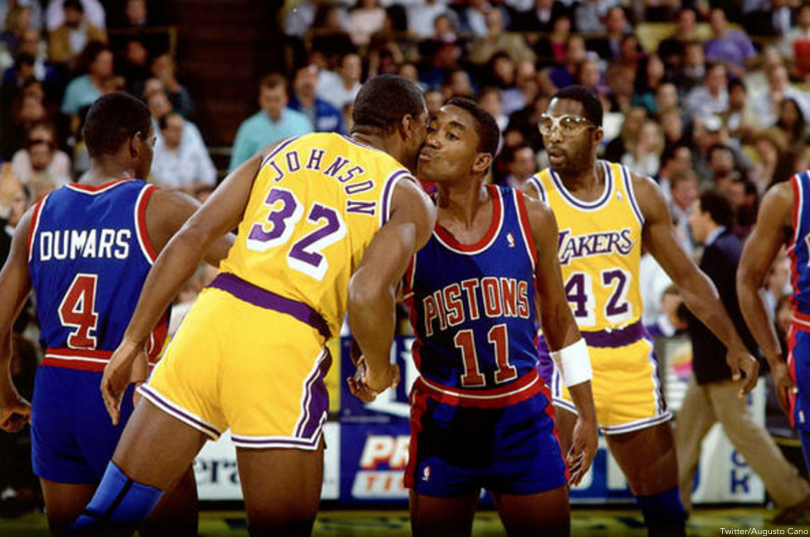
The fact the Lakers are on this list for a third straight time is a testament to just how good Magic, Kareem and Worthy's Lakers were. With that said, the Bad Boys Pistons were no slouch, overcoming the four-time Eastern Conference defending champion Celtics in 1988. After Johnson and Isiah Thomas kissed before Game 1, Detroit proved it could hang with the big boys, thanks to a scoring binge from Adrian Dantley, who averaged 21.3 in the series. The Pistons won Games 1, 4 and 5 to put LA on the brink back at The Forum. In Game 6, Thomas delivered one of the sport's legendary performances. Despite spraining his ankle in the middle of the third quarter, Thomas finished with 11 of the Pistons' last 15 points in the quarter. His 25 third quarter points set an NBA Finals record for points in a quarter. The fourth quarter was a different story, as the Lakers survived, 103-102. Two days later, with Thomas hobbling–he lost the ball in the final seconds–the Lakers won Game 7, 108-105. In 1989, the Pistons ruled the season from start to finish and swept the Lakers in the Finals. Lakers fans will blame on a hamstring pull suffered by Johnson in Game 2 (he only played a few minutes in Game 3 after that), but the Pistons backed up their sweep with a repeat championship the following season against the Blazers.
Chicago Bulls vs. Utah Jazz (1997-1998)
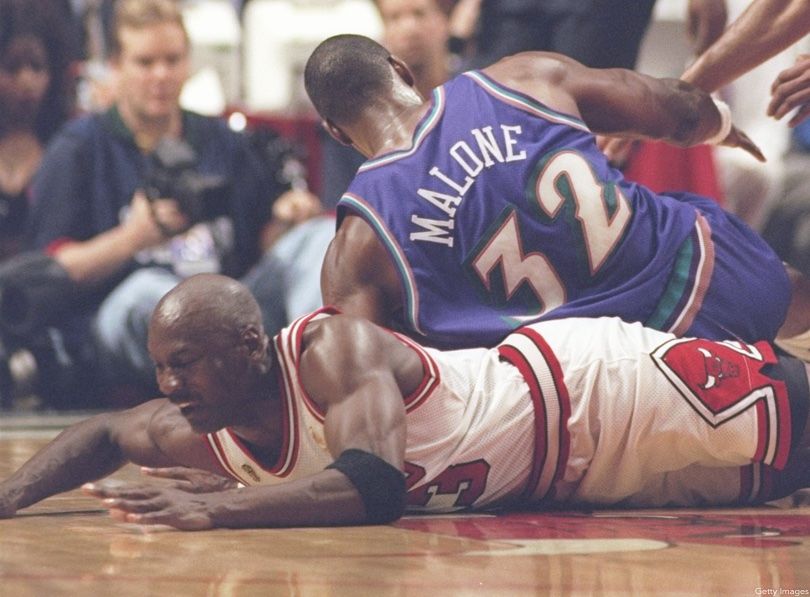
Michael Jordan slayed four challengers in his first four NBA Finals appearances, but the Jazz finally arrived as an established threat in 1997. Karl Malone was the 1996-97 NBA MVP, and with Malone at 33 years old and John Stockton 35, Utah had a short window of opportunity. The two teams each won their first two home games with a pivotal Game 5 in Salt Lake City. In what would become known as "The Flu Game," a visibly sick Michael Jordan played the game in bursts, scoring 38 points. With 25 seconds left, Jordan broke an 85-85 tie with a 3-pointer that ultimately won Chicago the game. In Game 6, with the scored tied at 86, Jordan held the ball as the shot clock ran down, but rather than take a shot, kicked to Steve Kerr at the top of the key. Kerr drilled a jumper for an 88-86 lead with five seconds left, and the Bulls won, 90-86. In 1998, Jordan took the season MVP back from Malone, but the Jazz held home court advantage. Utah won Game 1 in overtime, but the Bulls took the next three games, including a 96-54 annihilation in Game 3. After a Game 5 Jazz win, Game 6 would Jordan's final game as a Bull. Down 86-85 in the final minute, Jordan stripped Malone and crossed up Bryon Russell for a go-ahead jump shot with five seconds left. Jordan held his follow-through in what would become the iconic shot of his career. Neither the Bulls nor Jazz has made the NBA Finals since.
Boston Celtics vs. Los Angeles Lakers (2008, 2010)
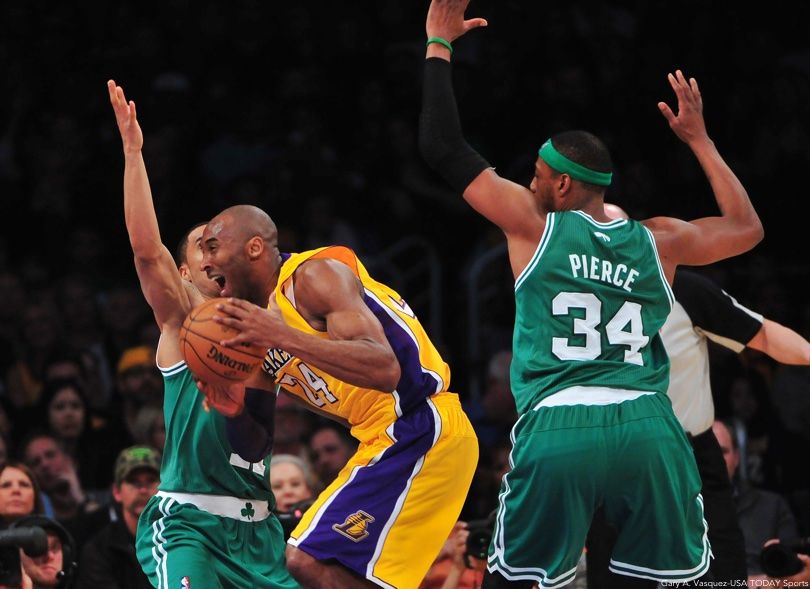
The Celtics finished with the worst record in the Eastern Conference in 2006-07. However, Danny Ainge traded picks and prospects in two separate deals in the offseason for Kevin Garnett and Ray Allen, joining superstar Paul Pierce. The Celtics won 66 games in their first season with the new Big Three to lead the East. Meanwhile, Kobe Bryant finally legitimized the Lakers' decision to keep him over Shaquille O'Neal. With the help of mid-season acquisition Pau Gasol, Bryant's first true superstar partner since Shaq, the Lakers topped the Western Conference with 57 wins. The Celtics used their home-court advantage to jump out to a 2-0 lead and stole Game 4 in LA. Boston capped off the series with a blowout 131-92 Game 6 win, remembered by Kevin Garnett yelling, "Anything is possible!" during his postgame interview. In 2009, the Celtics were thwarted by the eventual Eastern Conference champion Magic in the second round, without Garnett, who missed the second half of the season with a right knee injury. The Lakers beat the Magic in the Finals in five games. In 2010 the Celtics, coming from the No. 4 spot, dispatched Dwyane Wade's Heat, LeBron James' Cavs and Dwight Howard's Magic en route to a Finals appearance. The Lakers made their third straight Finals with little stress after dropping two first-round games to 21-year-olds, Kevin Durant and Russell Westbrook. The Finals proved to be a classic, as both teams see-sawed through Games 1-4. The Celtics broke the trend, winning a second straight game in Game 5, as Rajon Rondo pushed the Celtics into a Big Four. In Game 6 back at the Staples Center, the fifth starter, Kendrick Perkins, suffered a PCL and MCL tear. The Lakers took advantage, winning 89-67. In Game 7, the Celtics desperately missed Perkins' presence, and Pau Gasol led the game with 18 rebounds. The Celtics clawed to within three on a Rasheed Wallace 3-pointer with 1:23 left. Metta World Peace, then-Ron Artest, matched with a 3-pointer of his own seconds later. The Lakers won 83-79. Both teams -- made up of considerably older players -- declined soon after, and neither has made a Finals since.
Miami Heat vs. San Antonio Spurs (2013-2014)
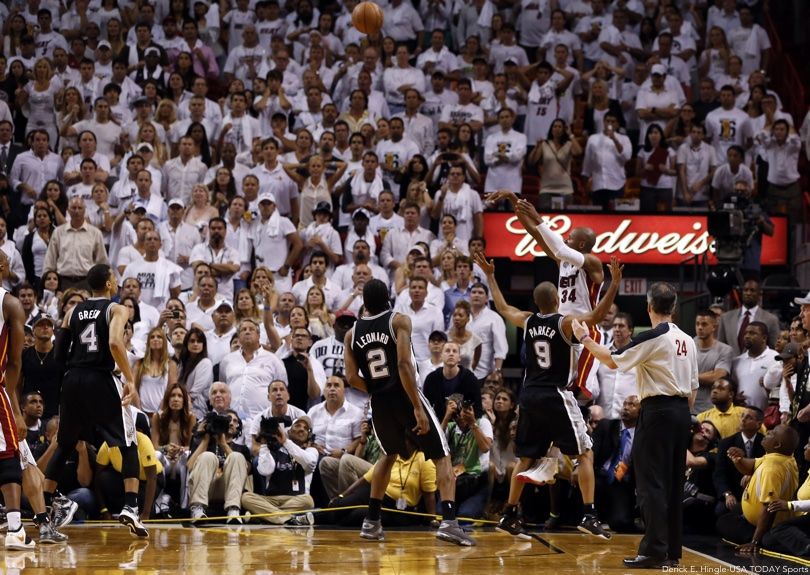
In 2013, the Heat were defending champions and appearing in their third straight Finals. LeBron James, Dwyane Wade and Chris Bosh won the Eastern Conference by 12 games. Meanwhile, the aging Spurs had a core of Tim Duncan, Tony Parker and Manu Ginobili, all of whom won championships in 2003, 2005 and 2007. The Spurs surprised many by taking three of the first five games from the mighty Heat, thanks in part to the emergence of young role players Kawhi Leonard and Danny Green. San Antonio won Game 3, 113-77 on an NBA Finals record 16 3-pointers, with seven by Green, six by Gary Neal and two by Leonard. In Game 6, 37-year-old Tim Duncan put up 30 points and 17 rebounds, but with the Spurs leading by three points in the final seconds, Spurs coach Gregg Popovich went small and pulled Duncan from the game. James missed a 3-pointer for the tie, but Bosh snatched the rebound and kicked out to 37-year-old Ray Allen, who drilled a step-back triple. The Heat won Game 6 in overtime before winning Game 7, 95-88, on 37 points, 12 rebounds and four assists from James. The Spurs played with a chip on their shoulder the entire 2013-14 season, winning a league-high 62 games. The two teams split Games 1 and 2 in San Antonio before the Spurs absolutely clobbered the Heat in the next three. Leonard led the Spurs in scoring in Games 3, 4 and 5, scoring 29, 20 and 22 points, respectively. Leonard won the NBA Finals MVP Award, as James played his final game with the Heat.
Golden State Warriors vs. Cleveland Cavaliers (2015-2016)
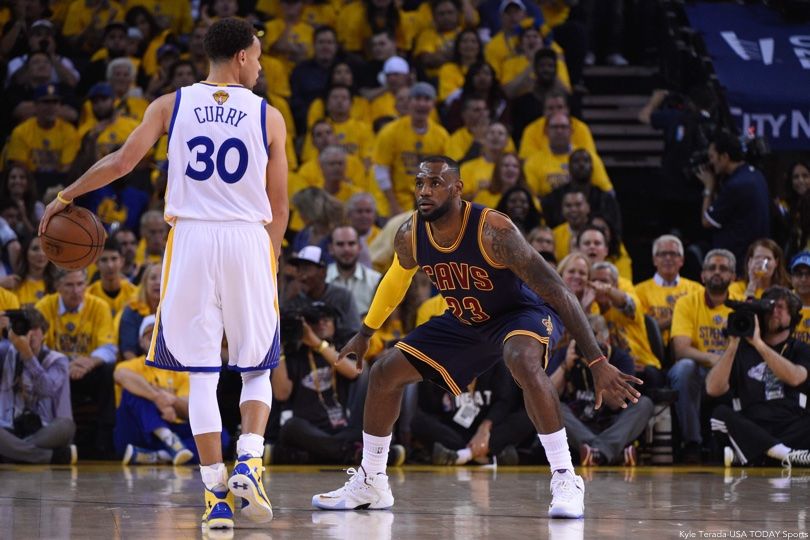
Now in Cleveland, James' next match came in the form of the upstart Warriors, a 67-win team focused on shooting from the outside. By the time the Cavs made the Finals, Kevin Love had already been lost to a dislocated shoulder, turning James' new big three into a dynamic duo with Kyrie Irving. Game 1 turned into an instant classic, as James led the Cavs with 44 points and Stephen Curry led the Warriors with 26. Curry and James each missed last-second shots, sending the game to overtime at 98-98. Overtime quickly became a nightmare for the Cavs. Irving dropped down in pain in what would later be diagnosed as a fractured left kneecap, knocking him out for the series. The Warriors outscored the Cavs 10-2 in overtime, with Cleveland's only points coming on a layup by James with 9.5 seconds left. Despite losing his two superstar teammates, James strung together two heroic performances in Games 2 and 3. In Game 2, James went for 39 points, 16 rebounds and 11 assists, as the Cavs won 95-93 in overtime. Irving's replacement, Matthew Dellavedova proved to be stifling defender on Curry. In Game 3, James had 40 points, 12 rebounds and 8 assists in what seemed to be developing into a trademark moment for one of the NBA's greatest players ever to give Cleveland a 2-1 series lead. In Game 4, as Steve Kerr inserted Andre Iguodala for Andrew Bogut in the starting lineup. Iguodala went for 22 points in a 103-82 road win. Curry scored 37 in Game 5, as the Warriors overcame another James triple-double for a 104-91 win. In Game 6, Iguodala and Curry each scored 25 to deliver Golden State its first title since 1975. This year, the two teams meet again, but this time, the Warriors are chasing all-time history, and the Cavs have their Big Three intact.
More NBA Finals:
-- 12 Great Seasons By A Rookie Head Coach
-- Here's What Curry Said To Durant After Game 7
-- Stephen Curry And Klay Thompson Are Breaking Each Other's Playoff Records
-- Follow Jeffrey Eisenband on Twitter @JeffEisenband.





